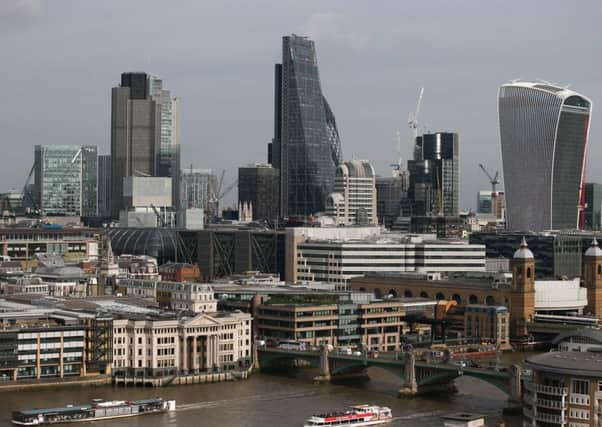UK growth is downgraded amid gloom in wake of Brexit


In further bad news for Chancellor Philip Hammond ahead of next month’s Budget, Britain’s trade deficit in goods ballooned to a record high in August, signalling no significant benefit to exporters from the Brexit-induced collapse in the pound.
And the Office for Budget Responsibility (OBR) completed a gloomy picture of the economy by warning that overly optimistic productivity forecasts will slash its outlook for UK growth.
Advertisement
Hide AdAdvertisement
Hide AdThe economic watchdog – whose forecasts form the basis of the Chancellor’s Budget decisions – has admitted it is set to “significantly” lower its predictions for the UK’s productivity growth over the next five years in next month’s forecasts.
In its latest World Economic Outlook, the IMF said it still expects UK growth to drop to 1.7 per cent in 2017 from 1.8 per cent in 2016, and slow even further in 2018 to 1.5 per cent.
The UK was the only major economy that failed to see growth revised higher by the IMF, which cut its 2017 outlook from 2 per cent back in July.
The IMF said the slowdown in growth was driven by a drop in household spending amid the pound’s post-Brexit collapse, which has sent inflation up to 2.9 per cent.
“The medium-term growth outlook is highly uncertain and will depend in part on the new economic relationship with the EU and the extent of the increase in barriers to trade, migration, and cross-border financial activity,” the report explained.
The United States also suffered a cut to growth projections this summer, but received an upgrade in the October report that nullified the move. The US economy is now expected to grow 2.2 per cent this year and 2.3 per cent in 2018.
Meanwhile figures from the Office for National Statistics (ONS) showed that Britain’s trade deficit in goods rose by £1.4 billion to £14.2bn as the country imported more chemicals, machinery and textiles.
In the three months to August, exports fell 2.7 per cent while imports rose 3.9 per cent.
Advertisement
Hide AdAdvertisement
Hide AdIt had been thought that British exporters would be able to benefit from the fall in the value of the pound, which makes UK goods cheaper for overseas buyers, but any real benefit has yet to materialise.
The ONS figures also show that Britain’s import of goods from the EU hit a record high in September.
The UK imported over £22bn worth of goods from the EU in August, but only exported £14bn, driving home the importance of a trade deal as the clock ticks towards Brexit in March 2019.
Oliver Kolodseike, senior economist at the Centre for Economics and Business Research, said: “The ONS figures highlight how dependent the UK is on trading with the EU.
“These figures indicate how important it is for the UK to make progress with Brexit negotiations as leaving the EU without a deal could have far-reaching negative consequences for exporters.”
In its Forecast Evaluation Report, the OBR said the productivity downgrade is expected to hit growth and weaken the public finances outlook.
The OBR warned: “The continued disappointing out-turns, together with the likelihood that heightened uncertainty will continue to weigh on investment, means that we anticipate significantly reducing our assumption for potential productivity growth over the next five years.”